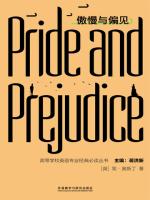傲慢与偏见书评
袁嘉欣
Pride and Prejudice, by Jane Austen, is a
literary gem first published in 1813. Set in 19th - century English
countryside, it delves into love, marriage, and social norms.
The story follows the Bennet family, with Mrs. Bennet eager
to marry off her five daughters. The arrival of Mr. Bingley and Mr.
Darcy at Netherfield Park ignites romantic affairs. Elizabeth Bennet,
intelligent and independent, meets Darcy at a ball. Darcy's initial
pride and aloofness, like his refusal to dance with Elizabeth, create
her prejudice against him. As they interact more, misunderstandings
and gossip cloud their relationship. However, Elizabeth starts to see
Darcy's true nature, and he confronts his pride to win her heart.
Austen masterfully uses this narrative for social commentary.
She satirizes the era's view of marriage as a means of social and
economic gain, as seen through Mrs. Bennet's desperation. Class
differences between the landed gentry and provincial gentry are also
highlighted, yet Austen suggests love can transcend these barriers, as
shown by Elizabeth's choice.
Regarding love, Austen presents various forms. Lydia's
impulsive elopement with Wickham contrasts with Elizabeth and Darcy's
profound love, which develops through mutual respect and personal
growth. Their relationship shows that true love demands self -
reflection and overcoming initial biases.
Austen's writing style is elegant, witty, and ironic. Her
dialogue vividly portrays characters, like Mrs. Bennet's chatter
revealing her materialism. Descriptions of the countryside and social
events enrich the story. Overall, Pride and
Prejudice remains a timeless classic, engaging readers with its
universal themes and masterful storytelling.



 京公网安备 11010802032529号
京公网安备 11010802032529号